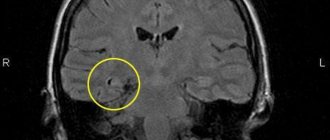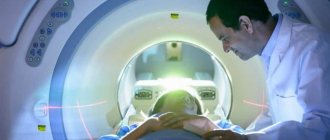Epilepsy is a chronic neurological disease that causes attacks of varying intensity in patients. With epilepsy, cognitive, sensory, and autonomic functions are impaired. The question of whether epilepsy is a hereditary disease is relevant for couples planning a pregnancy, as well as for people who have been diagnosed with this disease.
When making a diagnosis, neurologists at the Yusupov Hospital analyze the patient’s pedigree and identify the presence of epilepsy in his relatives. Cooperation between the Yusupov Hospital and large research institutes makes it possible to conduct genetic research and identify the nature of inheritance of the disease.
Types of inheritance of epilepsy
The development of epilepsy can occur due to various reasons. Clients often come to the neurology clinic of the Yusupov Hospital with the question of whether epilepsy is inherited. Every person wants to have healthy children, so this issue is relevant both for epileptics and for people who do not suffer from this disease.
Depending on the causes of development, the following types of epilepsy are distinguished:
- symptomatic, or acquired form, is associated with diseases of the cardiovascular, nervous systems, and various injuries;
- bdiopathic, or genuine, has a primary origin, which is caused by genetic disorders. In this case, epilepsy is inherited;
- The riptogenic form is characterized by unknown causes.
Genuine epilepsy can be transmitted as a dominant or recessive trait. An example of inheritance by a dominant trait is Rolandic epilepsy. Transmission of the disease in this case occurs through one sex and a direct line through one generation. So, if epilepsy is inherited from a father, then his child will be healthy, but his grandson will have this disease.
When inheriting a recessive trait, for example, juvenile myoclonic epilepsy, it is necessary that each parent is a carrier of this disease. In this case, epilepsy may not manifest itself in parents.
It is important for a neurologist to determine whether epilepsy is inherited, since the treatment tactics for epilepsy depend on its form. The epilepsy treatment program is drawn up by specialists at the Yusupov Hospital, taking into account the results of examinations and data collected by a neurologist.
Is epilepsy inherited?
Epilepsy is perhaps one of the most mysterious and inexplicable diseases. Moreover, in many cases, the causes of this neurological disease remain unclear, and questions remain unanswered. And one of them: is epilepsy inherited?
Who has epilepsy
Unfortunately, today epilepsy is a fairly common disease. In fact, from 0.5% to 0.9% of the world's population suffers from it - regardless of race, gender and place of residence. Those. For every 200 people there is at least 1 patient. In the countries of the former USSR alone, about 2.5 million people suffer from this disease! And in Europe, where there are about 400 million people, about 2 million children suffer from epileptic seizures.
In addition, the disease affects not only the patients themselves, but also their friends, relatives, colleagues, and acquaintances who are in one way or another involved in the life of a person with epilepsy. So almost every person has at least once witnessed an epileptic attack or knows people whose relatives are sick.
Previously, it was mistakenly believed that a person is already born with epilepsy, and that this is a disease exclusively of children. But this is far from true. The disease can appear at any age. Moreover, the older a person becomes, the higher the likelihood of him developing epilepsy, especially after 65 years.
Epileptic seizures can be caused by various brain injuries, including injuries, tumors, strokes and infections, and in 70% of cases, the cause of the disease cannot be explained at all, so no one is immune from epileptic seizures. Under certain circumstances, virtually anyone at any age can be exposed to this complex disease.
The main causes of the disease
As we have already said, in 70% of cases the real cause of epileptic seizures remains unknown. This form of epilepsy is called primary, idiopathic or cryptogenic.
In the remaining 30% of patients, the occurrence of epileptic seizures is mainly associated with various diseases of the brain caused by trauma, tumors or infection. In addition, such changes can be provoked by: abnormalities of cerebral vessels, multiple sclerosis, alcoholism, intoxication of the body and even severe stress. This form of epilepsy is called symptomatic or secondary.
As for the hereditary factor, as scientists involved in research in this area prove, it plays a role in only 8% of cases of the total number of patients. It has been proven that only some forms of epilepsy can be inherited. Therefore, sick parents may well have healthy children. Although the risk of developing the disease in such children undoubtedly increases.
Hereditary factors
Thus, experts say that in the case of a mother’s illness with epileptic seizures, the risk of the disease in her child ranges from 2.8% to 8.7%, and in the case of a father’s illness, it ranges from 1% to 3.6%. However, it must be taken into account that even without existing heredity, the risk of developing epileptic seizures in any family is at least 1%.
Thus, the presence of the disease in the father of the child only slightly increases the risk of his developing epileptic seizures, while the disease in the mother of the child has a great risk for his health. But if both parents are sick, the risk of illness in their offspring increases 10 times - up to 20-30%.
Forms of pathology
According to scientists, genuine or idiopathic epilepsy is inherited. But this does not always happen, since no clear mechanisms of transmission of the disease have been identified.
There are two classes of epilepsy that are inherited in a dominant manner: Rolandic and Juvenile Myoclonic.
So, in the first case, the disease is transmitted through a generation exclusively through the direct line of inheritance, in case of a gender match. That is, either along the male or female line. The offspring of the opposite sex, in this case, becomes only a carrier of such a gene. Example: when a mother suffers from epilepsy, her child will be healthy, but her grandchildren may become carriers of such a gene or develop epilepsy themselves.
In the second case of the disease transmission mechanism at the gene level, epilepsy is transmitted according to a recessive trait. However, this type of epilepsy is recorded extremely rarely, because for a child to have congenital signs of the disease, both parents must have a similar gene.
In any case, only a geneticist can make a diagnosis taking into account heredity, because hereditary epilepsy is extremely difficult to diagnose.
Diagnosis of hereditary epilepsy
A neurologist at the Yusupov Hospital will be able to answer the patient’s question about whether epilepsy in this case is a hereditary disease only after a thorough examination. For diagnostic purposes, the patient is prescribed MRI and EEG. The absence of functional lesions of brain structures may indicate genetic factors in the development of epilepsy.
Genetic testing can determine whether epilepsy is inherited from the father or mother. The main indications for this procedure are:
- burdened heredity;
- suspicion of monogenic epilepsy;
- combination of epilepsy with mental disorders, congenital defects and other pathologies;
- exclusion from several types of genetic epilepsies.
The Neurology Clinic of the Yusupov Hospital is equipped with high-precision European equipment, which reduces the processing time of results and increases their reliability. An important advantage of examination at the Yusupov Hospital is the absence of queues and visits to specialists at a time convenient for the patient.
Epilepsy and heredity
Epilepsy does have the ability to be inherited, but its hereditary nature depends on the form of the disease. For example, the idiopathic form of epilepsy is considered hereditary and carries about a 7% risk of developing any form of epilepsy in the offspring.
In any case, the exact process of genetic transmission of this disease is still unknown. It is only known that 50% of people suffering from epilepsy in their family had relatives suffering from the same disease.
The risk of genetic transmission of epilepsy from mother (2.8%-8.7%) to child is much more significant than from father (1%-3.6%). However, if both parents are genetically predisposed, the risk increases 10-fold. I would also like to note that the risk of developing epileptic seizures, even in families without a genetic predisposition, is more than 1%.
Thanks to research, it has been revealed that the hereditary factor in the transmission of this disease accounts for only 8% of the total number of patients. Therefore, even with a genetic predisposition, there is a high probability that parents can give birth to a completely healthy child.
In fact, epilepsy, as a disease itself, is not inherited, but it is the organic structure of the neurons of the brain and their resistance to physical influence that is transmitted.
In a word, a predisposition to this disease is transmitted, and not the disease itself. That is, the interaction of heredity with other life factors plays a large role in the development of this disease: environmental conditions, past diseases, the psychological type of a person.
This disease cannot be predicted even if one knows for sure that the gene for its inheritance exists, and it is also impossible to know in which of the worships it will manifest itself. Sometimes additional conditions are needed to activate this gene, such as a previous infection, traumatic brain injury, alcoholism, or severe stress.
In order to approximately calculate the probability of genetic predisposition, you need to consult with a geneticist, who, taking into account all individual factors, will be able to answer your questions.
Perhaps very soon, with the help of science, more clear answers will appear to questions about the genetic predisposition of epilepsy, but for now all that remains is to fight the existing disease, for the treatment of which many well-functioning medications have been produced, which in turn help to achieve very positive results in treatment.
Treatment of hereditary epilepsy at the Yusupov Hospital
Modern experts have discovered that epilepsy is inherited in certain cases. When patients come to the Yusupov Hospital with complaints of epileptic attacks, neurologists determine what factors determine the development of the disease. This information is necessary not only for making a diagnosis, but also for choosing adequate treatment tactics.
The methods currently used in medicine to treat epilepsy achieve remission in more than 70% of cases. Drug therapy for epilepsy is leading, but it is successfully combined in the neurology clinic with other methods.
The technologies used at the Yusupov Hospital make it possible to determine whether epilepsy is transmitted in a particular case, and what is the mechanism of its manifestation. At the Neurology Clinic, real medicine is successfully combined with high-quality patient care. To receive specialist advice and quality treatment for epileptic seizures, make an appointment by calling the Yusupov Hospital.
Causes
An epileptic attack occurs as a result of disturbances in the processes of excitation and inhibition in the cells of the cerebral cortex. The brain consists of a dense plexus of nerve cells interconnected. Cells convert the excitation perceived by the senses into an electrical impulse and transmit it to other cells in the form of an electrical impulse. Therefore, an epileptic attack can be compared to an electrical discharge like a thunderstorm in nature.
There are many factors that contribute to the occurrence of epilepsy. Hereditary predisposition also plays an important role. It has been noted that in those families where there are relatives suffering from epilepsy, the likelihood of developing epilepsy in the child is higher than in those families where there are no diseases in relatives. In recent years, the hereditary nature of a number of forms of epilepsy has been convincingly proven, since the genes responsible for their occurrence have been discovered. At the same time, the opinion that epilepsy is necessarily inherited is erroneous. In the vast majority of cases, epilepsy is not a hereditary disease, that is, it is not transmitted from father or mother to child. Many forms of epilepsy are multifactorial in nature, that is, they are caused by a combination of genetic and acquired factors. The contribution of genetic factors is significant, but not decisive.
In some forms of epilepsy, which are called symptomatic, the cause of the disease is brain damage due to:
- congenital malformations (malformations of the cerebral cortex)
- intrauterine infections
- chromosomal syndromes
- hereditary metabolic diseases
- birth damage to the central nervous system
- tumors
- nervous system infections
- traumatic brain injury
Presentation on World Brain Day 2015 / PPT, 9 MB








